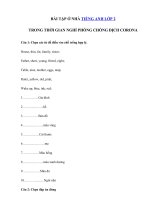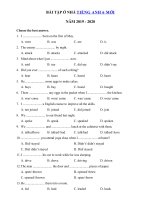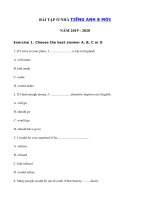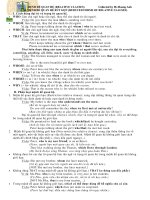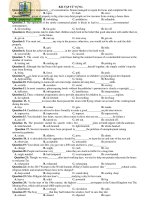bài tập ôn tập trong thời gian nghỉ dịch môn tiếng anh
Bạn đang xem bản rút gọn của tài liệu. Xem và tải ngay bản đầy đủ của tài liệu tại đây (661.82 KB, 8 trang )
<span class='text_page_counter'>(1)</span><div class='page_container' data-page=1>
<b> MỆNH ĐỀ QUAN HỆ (RELATIVE CLAUSES) Collected by Ms Hoang Anh </b>
<b>& MỆNH ĐỀ QUAN HỆ RÚT GỌN (REDUCED FORMS OF RELATIVE CLAUSES) </b>
<b>I. Cá ch dùng đại từ và trạ ng từ qua n hệ. </b>
<b>WHO: làm chủ ngữ hoặc tân ngữ, tha y thế cho danh từ chỉ người. </b>
<b> Ví dụ: Do yo u know the man who is standing over there. </b>
<b>WHOM: làm tân ngữ, thay thế cho danh từ chỉ ng ười. </b>
<b>Ví dụ: Peter keeps talking ab out the girl whom / who he met last week. </b>
<b>WHICH: làm chủ ngữ ho ặc tân ngữ, thay thế cho danh từ chỉ vật. </b>
<b>Ví dụ: Please reco mmend me a restaurant which ser ves seafood. </b>
<b>THAT: làm chủ ngữ hoặc tân ngữ, tahy cho cả d anh từ chỉ ng ười và danh từ chỉ vật. </b>
<b> Ví dụ: Do yo u know the man who / that is standing over there. </b>
<b> Peter keep s talking about the gir l whom / that he met last week. </b>
<b> Please recommend me a restau rant which / that serves seafoo d. </b>
<i><b> That luôn được dùng sau cụm danh từ gồ m cả người lẫn vậ t, sa u cá c đạ i từ everything , </b></i>
<i><b>something, anything, all, little, much, none và dạ ng so sánh nhất. </b></i>
<b> Ví dụ: The firemen managed to rescue the old woman and her cats that were stuck in the </b>
burning housse.
<b> She is the most beau tiful girl t hat I’ve ever met. </b>
<b>WHOSE: chỉ sự sở hữu </b>
<b> Ví dụ: Peter does not like the secretar y who se ideas are contrar y to his. </b>
<b>WHEN (= on / at / in which) : tha y cho danh từ chỉ thời gian </b>
<b> Ví dụ: Tell me the time when (= at which) we can d epart. </b>
<b>WHERE (= at / in / from / on which) : thay cho danh t ừ chỉ nơi chố n </b>
Ví dụ: Do yo u know the village wher e (in which) your father was bo rn?
<i><b>WHY (= for which): dùng để chỉ lý do, thay cho the reason. </b></i>
Ví dụ: That is the reason why (= fo r which) John refused to come.
<b> II. Phâ n loại mệnh đề quan hệ. </b>
1 . Mệnh đề qu an hệ giới hạn (Restr ictive relative clau se): cu ng cấp những thô ng tin quan trọng cần
thiết để xác định danh từ hoặc cụm danh từ đứng tr ước.
<b> Ví dụ: M y father is the man who understa nds me the mo st. </b>
<i> (Bố tôi là ngư ời hiểu tôi nhất.) </i>
<b> Do you still remember the da y when we first met a t university? </b>
<i> (Bạn còn nhớ ngày chúng ta gặp nhau lần đầu ở trường đạ i học không?) </i>
<i> Đại từ quan hệ làm tân ngữ who(m), which , that và trạng từ quan hệ when , why có thể được </i>
bỏ tro ng mệnh đề quan hệ giới hạn.
<b> Ví dụ: He promised to lend me the boo k ( which/that) he bo ught yesterd ay. </b>
<i> (Anh ấy h ứa cho tô i mượn qu yển sách anh ấy mua hô m qua.) </i>
<b> Peter keep s talking ab out the gir l ( who/that) he met last week. </b>
2 . Mệnh đ ề qu an hệ không giớ i hạn (No n-restrictive relative clau se): cung cấp thêm thông tin về
mộ t người, mộ t vật hoặc một sự việc đ ã được xác định. Mệnh đề quan hệ khơ ng giới hạn cách
mệnh đề chính bằng d ấu phẩ y (,) hay dấu gạch ngang (-).
<b> Ví dụ: Peter, who is my new friend, is an architect. </b>
<i> (Peter, người bạn mới quen của tôi, là kiến trúc sư). </i>
<b> The y like walking along the Tham es, which flows thro ugh London. </b>
<i> (Họ thích đi dọc sơng Thames, co n sơng chả y qua Luân Đôn.) </i>
Khô ng được bỏ các đ ại từ quan hệ làm tân ngữ và trạng từ q uan hệ trong mệnh đ ề qu an hệ khô ng
giới hạn.
<b> Ví dụ: She met m y brother, whom she later married. </b>
<i> (Cô ấy gặp anh trai tôi, người mà sau đó cơ ấy đã kết hơn .) </i>
[NOT She met m y brother, she later married.]
<b>Khô ng dùng THAT trong mệnh đề quan hệ không giới hạn.( THAT ko đứng sau dấy phẩy) </b>
<b>Ví dụ: Ms.Pike, who is my form teacher, is ver y nice to her stud ents. </b>
<i> (Cô Pike, giáo viên chủ nh iệm của tôi, rất tử tế với học sinh.) </i>
<b> [NOT Ms.Pike, tha t is m y form teacher,...] </b>
<i><b>Trong mệnh đ ề quan hệ không giới hạn, which có thể được dùng để bổ nghĩa cho cả câu. </b></i>
<b> Ví dụ: Peter failed again, which do es not make u s surprised . </b>
</div>
<span class='text_page_counter'>(2)</span><div class='page_container' data-page=2>
<b> III. Giới từ trong mệnh đề quan hệ. </b>
Tro ng mệnh đề quan hệ, giới từ có thể đứng tr ước đại từ quan hệ làm tân ngữ của giới
<i><b>từ (whom, which, whose) hoặc sau động từ (ngoại trừ with out). Giới từ không được đặt </b></i>
<b>trước who và that. </b>
<b> Ví dụ: The people with whom I was sitting were ver y no isy. </b>
<b> [NOT The people with who / that I was sitting…] </b>
<b> Or: The people (whom/that) I was sitting with were ver y noisy. </b>
<i> Khi giới từ là thành p hần củ a cụm động từ thì khơng thể đem giớ i từ ra trước whom, which, </i>
<i>whose. </i>
<b> Ví dụ: This is the book which I am looking fo r. </b>
<b> [NOT This is the boo k for which I am loo king.] </b>
<b> IV. Dạng rút g ọn của mệnh đề quan hệ </b>
1 . Ngữ phân từ (participle phrase)
Ngữ hiện tại phân từ (p resent p articip le p hr ase) đ ược dùng khi đ ộng từ trong mệnh đ ề qu an hệ ở
<b>thể chủ độ ng (active) => V-ing </b>
<b> Ví dụ: M y sister is the girl who is wearing a blue dress. </b>
⇾ My sister is the girl wearing a blue dress.
Ngữ qu á khứ phân từ (past participle phrase) đ ược dùng khi đ ộng từ trong mệnh đề qu an hệ ở thể
<b>bị động (p assive).=> PII </b>
<b> Ví dụ: The novel which wa s written by Peter’s father is ver y inter esting. </b>
⇾ The novel written by Peter’s father is ver y interesting.
<b>2 . Cụm động từ ngu yên mẫu (to-infinitive phrase) </b>
<i> To-infinitive có thể được dùng khi đ ại từ q uan hệ làm chủ ngữ đứng sau first, second, …, </i>
<i>last, next, only, d ạng so sánh nhất ho ặc để chỉ mục đích, sự cho phép. </i>
<b> Ví dụ: Tom is the last agent who left the office yesterday evening. </b>
⇾ Tom is the last agent to leave the office yesterday evening.
<b> Please take us to a cafeter ia where we can ha ve a delicio us meal. </b>
⇾ Please take us to a cafeteria to have a delicious meal.
3 . Ngữ danh từ (nou n phrase)
<b> Ví dụ: Ms Young, who is the scho ol libraria n, often lends me reference books. </b>
⇾ Ms Young, the school librarian, often lends me reference books.
<b>I. MỆNH ĐỀ QUAN HỆ </b>
<i><b> Exercise 1: Choose the best answer to complete each sentence </b></i>
1. I was talking to a businessman ______ works with my father.
A. which B. when C. who D. –
2. That’s the car ______ crashed into his house.
A. what B. that C. which D. B & C
3. She likes sleeping in the bed ______ her mother used to sleep.
A. which B. where C. that D. -
4. Do you know the man ______ watch is made of gold?
A. which B. who C. whose D. that
5. Kate Simpson, ______ husband died last year, has lost her job.
A. who B. whose C. whom D. her
6. He came to congratulate me, ______ seemed a surprise to everyone.
A. who B. that C. which D. whom
7. Nha Trang ______ is a famous beach in Vietnam, is very crowded in summer.
A. which B. , which C. , that D. , where
8. This is Mary ______ volunteers to come to Vietnam to teach the poor children.
A. , whom B. , who C. who D. that
9. The book ______ was written a long time ago can not be used as references.
A. ,which B. which C. , that D. what
10. Do you remember Ha Long Bay, ______ has many beautiful caves?
A. that B. where C. what D. which
11. The literature book ______ was not expensive at all.
</div>
<span class='text_page_counter'>(3)</span><div class='page_container' data-page=3>
13. The reason ______ she didn’t come home last night was unacceptable?
A. when B. why C. which D. that
14. ______ the teacher had told me came true.
A. what B. which C. that D. whom
15. He is a cricket player ______ abilities include fast bowling and powerful batting.
A. where B. whose C. whom D. of which
16. You may enroll our course by e-mail _____ can be faster than other registration forms.
A. who B. where C. which D. when
17. Bournemouth, ______ we are going to visit, is a real paradise for the retired.
A. that B. what C. which D. where
18. She is the famous actress ______ everybody admires.
A. who B. whom C. which D. whose
19. My nephew ______ chose a lot of toys at the Toy World store for his father, ______ is my elder brother, paid
a large amount of money.
A. which / whose B. whom / who C. which / who D. who / who
20. We’ll come in August ______ the schools are on holiday.
A. that B. where C. which D. when
21. This is the village in ______ my family and I lived for six years.
A. which B. that C. whom D. where
22. The pupils ______ we took to the amusement park behaved themselves very well.
A. whose B. with whom C. whom D. which
23. The engineer ______ our company relies is on holiday.
A. who B. whom C. whose D. on whom
24. The pollution ______ they were talking is getting worse.
A. that B. about which C. which D. whom
25. The girl ______ I borrowed the dictionary asked me to use it carefully.
A. whose B. from whom C. from whose D. whom
26. The people to ______ she was speaking didn't know German.
A. who B. whose C. that D. whom
27. My school has got new classrooms, all of ______ are air-conditioned.
A. what B. which C. that D. them
28. Jane has three sons, all of ______ work in the army.
A. them B. which C. who D. whom
29. Bournemouth, ______ we are going to visit, is a real paradise for the retired.
A. that B. where C. which D. in which
30. I don’t know the reason ____ she hasn’t talked to me recently.
A. on which B. for which C. of which D. about which
<i><b> Exercise 2: Find the part that needs correcting </b></i>
1. The girl who (A) Tuan is talking is the most intelligent (B) one (C) I have ever known.(D)
2. She is in charge of (A) making (B) the candidate list which (C) I want to add myself (D).
3. The village which (A) Napoleon lost (B) the last battle (C) was (D)Waterloo.
4. The light has gone out (A), this (B) makes it (C) difficult to continue (D)the lesson.
5. You will enjoy (A) the views in (B) Hanoi which (C) is the capital of (D) Vietnam.
6. What are (A) the people who lives (B) in the other (C) parts of Vietnam like (D)?
7. My father will fly (A) to Ha Noi, that (B) is the (C) capital city of (D) Vietnam.
8. Every (A) student who majors (B) in English are (C) ready to participate in (D) the orchard contest.
9. Mother’s Day (A) is the day (B) when children show their love to (C) their mother on.(D)
10. Do you know (A) the reason (B) when (C) English men travel to the left? (D)
11. Thank you for (A) your letter, which (B) you invited (C) me to (D) your wedding.
<b>12. This is the (A) picture of (B) the missing (C) girl for whom (D) we are looking. </b>
13. She is (A) the most (B) beautiful woman who (C) I have ever (D) met.
14. The singer about who (A) I told (B) you yesterday is coming (C) here tomorrow.(D)
15. Mother’s Day (A) is the day (B) when children show their love (C) to their mother on.(D)
16. Nancy is always (A) late for (B) class which (C) makes the teacher angry.(D)
17. Pele, of whom (A) I respect most (B) is the most (C) famous football player all the time. (D)
18. Neil Armstrong was the first (A) man who (B) walked on (C) the moon.(D)
</div>
<span class='text_page_counter'>(4)</span><div class='page_container' data-page=4>
20. He was the only (A) man who (B) reached the top (C) of the (D) mountain.
<i><b> Exercise 3: Choose one sentence that best rewrites the sentence given: </b></i>
1. This man studies biology. What do you call him?
A. What do you call a man who studies biology?
B. What do you call a man, who studies biology?
C. What do you call a man studies biology?
D. What do you call a man whom studies biology?
2. Hemingway developed a very concise writing style. His name is well- known throughout the world.
A. Hemingway, his name is well- known throughout the world, developed a very concise writing style.
B. Hemingway, whose is name well- known throughout the world, developed a very concise writing style.
C. Hemingway, whose name is well- known throughout the world, developed a very concise writing style.
D. Hemingway, who developed a very concise writing style, his name is well- known throughout the world.
3. This is the battle field. The soldiers fought there.
A. This is the battle field which the soldiers fought.
B. This is the battle field that the soldiers fought.
C. This is the battle field where the soldiers fought there.
D. This is the battle field where the soldiers fought.
4. He was born in 1983. There was a severe drought that year.
A. He was born in 1983 when there was a severe drought.
B. He was born in 1983 when was there a severe drought
C. When there was a severe drought in 1983 he was born.
D. He was born in 1983, there was a severe drought when
5. John Montagu was an English Earl. He invented the sandwich.
A. John Montagu, whose invented the sandwich, was an English Earl.
B. John Montagu, who invented the sandwich, was an English Earl.
C. John Montagu, that invented the sandwich, was an English Earl.
D. John Montagu, invented the sandwich, was an English Earl.
6. Flies carry diseases. They come mostly in the summer.
A. Flies, that come mostly in the summer, carry diseases.
B. Flies which come mostly in the summer carry diseases.
C. Flies, which come mostly in the summer, carry diseases.
D. Flies that carry diseases come mostly in the summer,
7. There was a candle. It was burning in the room.
A. There was a candle burnt in the room.
B. There was a candle was burning in the room.
C. There was a candle to burn in the room.
D. There was a candle that was burning in the room.
8. I see a boy. He is running across the street.
A. I see a boy is running across the street.
B. I see a boy to run across the street.
C. I see a boy, who is running across the street.
D. I see a boy who is running across the street.
9. He drew from the bag a watch. It had been given for his birthday.
A. He drew from the bag a watch had been given for his birthday.
B. He drew from the bag a watch that was given for his birthday.
C. He drew from the bag a watch which had given for his birthday.
D. He drew from the bag a watch which had been given for his birthday.
10. One of the drivers told me all about what had happened. He witnessed the whole accident.
A. One of the drivers told me all about what had happened, who witnessed the whole accident.
B. One of the drivers who witnessed the whole accident told me all about what had happened.
C. One of the drivers who told me all about what had happened witnessed the whole accident.
D. One of the drivers told me all about what had happened witnessed the whole accident.
11. They asked me a lot of questions. I couldn't answer most of them.
A. They asked me a lot of question which I couldn't answer most of them.
B. They asked me a lot of questions, I couldn't answer most of which.
C. They asked me a lot of questions, most of which I couldn’t answer.
</div>
<span class='text_page_counter'>(5)</span><div class='page_container' data-page=5>
12. Mary has three brothers. All of her brothers are married.
A. Mary has three brothers, all of them are married.
B. Mary has three brothers, all of whom are married.
C. Mary has three brothers all of whom are married.
D. Mary has three brothers of who are married.
13. Neil couldn't come to the party. This was a pity.
A. Neil couldn't come to the party that was a pity.
B. Neil couldn't come to the party, that was a pity.
C. Neil couldn't come to the party which was a pity.
D. Neil couldn't come to the party, which was a pity.
14. Mr Carter is very interested in our plan. I spoke to him on the phone last night.
A. Mr Carter, to whom I spoke on the phone last night, is very interested in our plan.
B. Mr Carter who I spoke to him on the phone last night, is very interested in our plan
C. Mr Carter, who is very interested in our plan, I spoke to on the phone last night.
D. Mr Carter is very interested in our plan to whom I spoke on the phone last night.
15. That's the place. The accident occurred there.
A. That's the place where the accident occurred.
B. That's the place where the accident occurred there.
B. That's the place in that the accident occurred.
D. That's the place in which the accident occurred there.
16. He was born in 1983. There was a severe drought that year.
A. He was born in 1983 when there was a severe drought.
B. He was born in 1983 when was there a severe drought
C. When there was a severe drought in 1983 he was born.
D. He was born in 1983, there was a severe drought when
17. That is hopelessly inaccurate. She told it to you.
A. What that she told you is hopelessly inaccurate.
B. Everything that she told you hopelessly inaccurate.
C. She, who is hopelessly inaccurate, told you such a thing.
D. What she told you is hopelessly inaccurate.
18. Ann’s children couldn’t swim. She said that there should be more notices warning people.
A. Ann’s children, who couldn’t swim, said that there should be more notices warning people.
B. Ann said that there should be more notices warning people whose children couldn’t swim.
C. Ann, whose children couldn’t swim, said that there should be more notices warning people.
D. Ann’s children couldn’t swim who said that there should be more notices warning people.
19. The wedding took place last Friday. Only members of the family were invited to.
A. The wedding, which only members of the family were invited to, took place last Friday.
B. Only members of the family were invited to the wedding which took place last Friday.
C. The wedding took place last Friday, when only members of the family were invited to.
D. The wedding, where only members of the family were invited to, took place last Friday.
20. The book is about the usefulness of how to keep fit. I’m so keen on it.
A. The book is about the usefulness of how to keep fit, which I’m so keen on.
B. The book I’m keen on is about the usefulness of how to keep fit.
C. I’m keen on the book, that is about the usefulness of how to keep fit.
D. I’m keen on the book which about the usefulness of how to keep fit.
<b>II. REDUCED FORMS OF RELATIVE CLAUSES </b>
<i><b> Exercise 1: Choose the best answer to complete each sentence </b></i>
1. Tourists _____ from all over the world visit the romantic rivers in Italy.
A. to come B. come C. coming D. came
2. The man _____ to the policeman is my uncle.
A. talking B. to talk C. talk D. talks
3. The novel _____ by Patrick is a best-seller.
A. writing B. written C. wrote D. write
4. She was the last woman in the village _____ by that factory.
A. to employ B. employing C. to be employed D. employed
5. The house _____ three years ago actually belonged to us.
</div>
<span class='text_page_counter'>(6)</span><div class='page_container' data-page=6>
6. I _____ a novel _____ by O.Henry at seven yesterday evening.
A. read / was written B. was reading / was written
C. was reading / written D. read / written
7. The poor man _____ his life has just committed suicide.
A. boring with B. bored with C. being boring with D. to be bored with
8. Can you remember the girl _____ you the way?
A. shows B. showed C. showing D. to show
9. Do you know the man in red _____ towards your sister?
A. came B. comes C. to come D. coming
10. Credit cards _____ in international trade are very convenient.
A. used B. using C. which used D. uses
11. The boy is the only child in his family _____ all his parents’ property.
A. to inherit B. inheriting C. inherited D. being inherited
12. The lady_____ in blue is her aunt.
A. dressed B. dressing C. is dressing D. in dress
13. Marie Curie, _____, had great contributions to the world’s science.
A. to be a famous physicist B. being a famous physicist
C. a famous physicist C. was a famous physicist
14. Dinner _____ over, they returned home.
A. being B. be C. is D. was
15. The man in that picture, _______ Genghis Khan, was a Mongol emperor in the Middle Ages.
A. his name B. named C. naming D. with name
16. Galileo, _____ works _____ that the Earth revolves around the Sun, continued his scientific experiments
even when he went deaf and blind.
A. published/ to prove B. to publish/ proving C. publishing/ proving D. publishing/ proved
17. Any credit ______ in this semester requires approximately three hours of classroom work.
A. given B. giving C. to be given D. to give
18. The young man ______ after the court was found innocent of all the charges against him.
A. released B. to be released C. releasing D. to release
19. Nobody in the club ______ the coming party will have to give any amount of money.
A. attending B. will attend C. attended D. to attend
20. The students ______ for cleaning the classroom before the party should come an hour earlier.
A. responsible B. responsibility D. responsibly D. responded
<i><b>Identify the underlined part that needs correction </b></i>
1. The (A) experiment conducting (B) by Dr .Adams last (C) week was unsuccessful.(D)
2. They read (A) the words (B) “No Entry” writing (C) in (D) large letters.
3. Mary and (A) her dog are standing (B) over there go (C) to the (D) park every day.
4. That was (A) the (B) man to talk (C) to (D) your sister yesterday.
5. The first (A) May Day celebrated (B) in (C) England was in (D) 1890.
6. She is (A) the most (A) beautiful woman working (C) in (D) our company.
7. Amelia Earhart, to be (A) one of the pioneers in aviation, (B) attempted to fly (C) the world in 1937, but she
and her plane mysteriously disappeared over (D) the Pacific Ocean.
8. The (A) man helped (B) you yesterday is (C) a television reporter.(D)
9. The policeman (A) must try to catch (B) all the men driving (C) dangerously.(D)
10. My dad, being surprised (A) at (B) my strange behaviors, asked (C) me to give (D) clear explanation.
<i><b>Choose one option A, B, C or D corresponding to the sentence which has the same meaning as the original </b></i>
<i><b>one(s) </b></i>
1. It is more than one hundred years since the birth of Charles Dicken, the famous Novelist.
A. It is more than one hundred years when Charles Dicken, the famous novelist, born.
B. More than one hundred years ago, Charles Dicken, the famous born.
C. Since Charles Dicken is a famous novelist, he was born more than a hundred years ago.
D. Charles Dicken, the famous novelist, was born more than one hundred years ago.
2. She was the first woman in the Philippines. She was elected as the president of the country.
A. She was the first woman to be elected as the president of the Philippines.
</div>
<span class='text_page_counter'>(7)</span><div class='page_container' data-page=7>
D. She was the first woman elected as the president of the Philippines.
3. Our company holds the monopoly over the import of these chemicals.
A. Our company is one of the few companies allowed to import these chemicals
B. Ours is the only company allowed to import these chemicals.
C. All companies but ours are allowed to import these chemicals.
D. These exported chemicals are held by our company, which is monopoly.
4. Visitors come to admire the relics that were excavated from the ancient tombs.
A. Visitors come to admire the relics excavating from the ancient tombs.
B. Visitors come to admire the relics excavated from the ancient tombs.
C. Visitors come to admire the relics being excavated from the ancient tombs.
D. Visitors come to admire the relics to be excavated from the ancient tombs.
5. A picture was stolen by art thieves. It was painted by Munch.
A. Stolen by art thieves, a picture was painted by Munch.
B. Painted by Munch, a picture was stolen by art thieves.
C. A picture painted by Munch was stolen by art thieves.
D. All are correct.
<b>KEY </b>
PHẦN 1
EX1
1C 2D 3B 4C 5B 6C 7B 8B 9B 10D
11D 12B 13B 14A 15B 16C 17C 18B 19D 20D
21A 22C 23D 24B 25B 26D 27B 28D 29C 30B
EX2
1A 2C 3A 4B 5C 6B 7B 8C 9D 10C
11B 12D 13C 14A 15D 16C 17A 18B 19B 20B
EX3
1A 2C 3D 4A 5B 6B 7D 8D 9D 10B
11C 12B 13D 14A 15A 16A 17D 18C 19A 20B
PHẦN 2
EX1
1C 2A 3B 4C 5C 6C 7B 8C 9D 10A
11A 12A 13C 14A 15B 16C 17C 18A 19D 20A
EX2
</div>
<span class='text_page_counter'>(8)</span><div class='page_container' data-page=8>
EX3
</div>
<!--links-->


